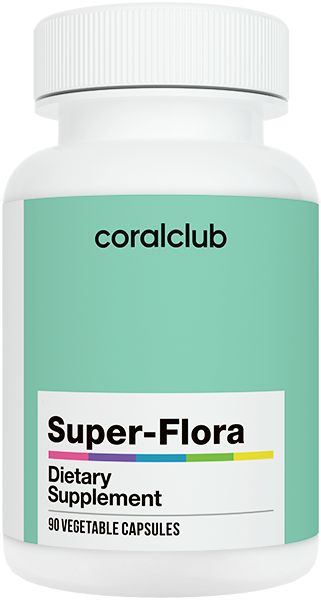A highly effective synbiotic composed of a balanced combination of probiotics (Bifidobacterium longum and Lactobacillus acidophilus) and prebiotics (inulin), which in combination provide real results for your intestinal microflora. The ratio of lactobacilli to bifidobacteria matches that found in a healthy digestive tract, and the inulin greatly improves the effectiveness of the probiotics and more importantly helps you maintain your microflora.
Advantages of Super-Flora
- Restores healthy intestinal microflora
- Prevents the development of dysbacteriosis, gases, heaviness in the stomach
- Improves metabolism and digestion
- Helps absorb nutrients and other healthy compounds
- Helps maintain a healthy intestinal microflora
- Helps with mild food poisoning, allergies and intestinal infections
The action of the active ingredients
Probiotics
Probiotics are living microorganisms that form the basis of the mifroflora in the body and maintain an optimal proportion of good bacteria, while suppressing the growth of pathogenic bacteria in the gastrointestinal tract, improving the overall functioning of the body. The most active and useful probiotics are bifidobacteria (longum) and lactobacilli (acidophilus).
Bifidobacteria
Bifidobacteria (Bifidobacterium longum) are the most numerous group of beneficial bacteria in the intestinal flora. The microflora of infants is 80-90% composed of these bacteria. They inhibit the growth and reproduction of harmful pathogenic and conditionally pathogenic bacteria in the gastrointestinal tract, protecting the body from intestinal infections and fermentation in the intestine. Together with other beneficial microorganisms, they play an active role in digestion, accelerating the breakdown of proteins and carbohydrates and improving the absorption of nutrients, generating their own enzymes to improve digestive function.
Bifidobacteria are involved in the synthesis of many vitamins – K, B group, including B3 and B9, essential amino acids, improving the absorption of calcium and vitamin D. These bacteria actively create lactic acid, which also suppresses pathogenic bacteria in the gastrointestinal tract. Thanks to the bifidobacteria in the body, allergic reactions are reduced, the immune system is strengthened and the digestive system begins to function properly.
Milk bacteria
Milk bacteria (Lactobacillus acidophilus), unlike bifidobacteria, are found in all areas of the gastrointestinal tract. The name Lactobacillus is translated from Latin as “bacteria living in milk”. In reality, lactobacilli are unrelated to dairy products. On the contrary, these microorganisms are deliberately added to cheeses, kefir, yogurt and buttermilk to obtain high-quality sour milk products.
First of all, lactobacilli are extremely important for the normal functioning of the equally important bifidobacteria. Many experiments have proven that when lactobacilli are insufficient or absent, sooner or later the number of bifidobacteria also decreases.
Just like bifidobacteria, lactobacilli destroy pathogenic flora and help maintain a healthy balance in the microbiome. They effectively fight the dangerous Helicobacter pylori, the cause of gastritis, stomach ulcers, candida, streptococci and staphylococci.
One of the most important functions of lactobacilli is the role they play in the immune system. On the one hand, they adhere to the epithelium of the small intestine, strengthening its barrier and protective functions. On the other hand, bacteria participate in the formation of immune cells, thanks to which the body is better prepared to resist various health-damaging factors (respiratory infections) and to keep the entire immune system healthy.
Both types of beneficial microorganisms (bifidobacteria and lactobacilli) activate the body’s detoxification functions, reduce the negative effects of pharmaceutical chemicals, low-quality food, gases, heaviness in the stomach and nausea.
Prebiotics
Prebiotics are a form of plant fiber, also called insoluble plant fiber (found in most plants) that has a beneficial effect on the body’s intestinal flora. The term “prebiotic” was introduced in 1995 by Professor of Food Microbiology Glenn Gibson (University of Reading, England). He defined it this way: Prebiotics are non-digestible food components that improve health by selectively stimulating the growth or activation of one or more types of good bacteria in the colon. Later, Dr. MB Roberfroid (2007) defined prebiotics as food ingredients selectively absorbed by intestinal microorganisms that change the composition and activity of the microflora, improving general well-being.
Even after the first intake of Super Flora capsule, you will feel an effect on the body. Drink one capsule a day during a meal.
Take advantage of all the benefits Coral Club can bring you. Don’t have an account yet?
